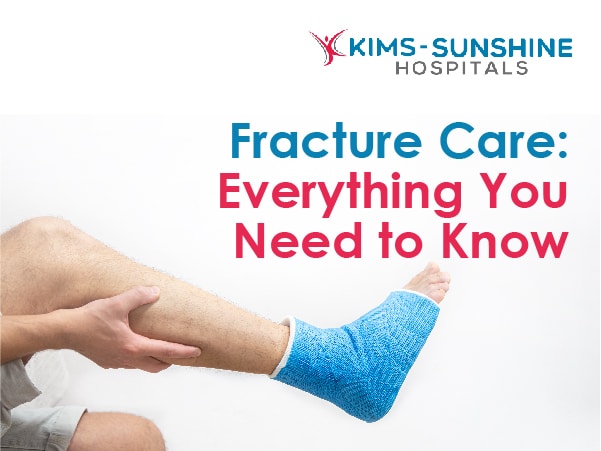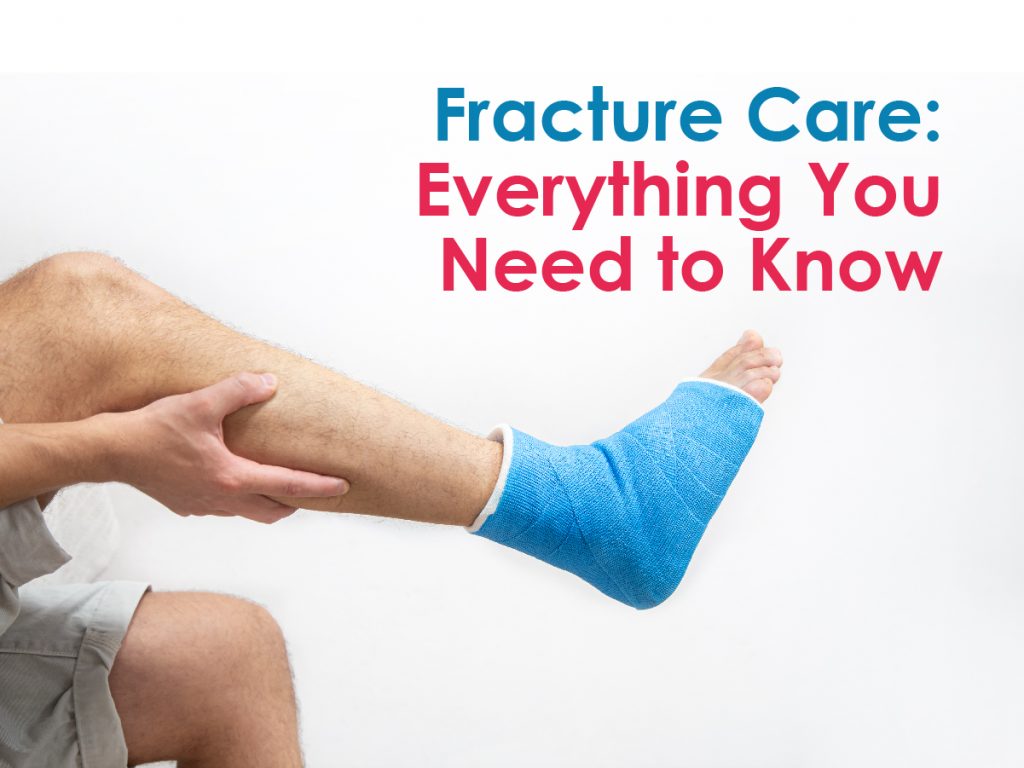
Fracture Care: Everything You Need to Know
By Dr. A. V. Gurava Reddy, Managing Director

Fractures are one of the most common injuries that can occur due to various reasons such as accidents, sports, or underlying ailments. It is essential to understand fractures for both preventing it and recovering from it. Discover essential fracture care insights: types, first aid, medical assessment, recovery steps, and prevention in our comprehensive guide.
Types of Fractures:
- Closed Fracture:
– The bone breaks but doesn’t cause any outer injuries
– Treatment includes immobilisation and pain management.
- Open Fracture:
– The Bone protrudes through the skin post-breakage
– This injury demands quick medical attention, surgery and proper care
- Hairline Fracture:
– Often a small crack in the bone, difficult to trace in an X-ray.
– Recommended recovery includes rest and healing.
- Comminuted Fracture:
– The bone breaks into multiple pieces.
– Comminuted fractures may require surgery to realign and stabilise the bone.
- Greenstick Fracture:
– This a common condition in children, where the bone bends easily
– Treatment involves casting to allow proper healing.
Fracture Care Steps:
- Immediate First Aid:
– If you suspect a fracture, keep the area in rest and immobile
– Put on some ice to reduce swelling and numb the pain
– Seek professional help swiftly.
- Medical Assessment:
– A healthcare professional may order an X-ray to help determine the extent and nature of the fracture.
- Immobilization:
– Rearrangement devices like splints, casts or braces are used to the set the bone prevent further damage and promote healing.
- Pain Management:
– Recovery period comes with some discomfort, which can be managed by pain medication prescribed by a medical professional.
- Surgical Intervention:
– Some fractures may require surgical intervention due to a big displacement or dislocation.
- Physical Therapy:
– Post the initial healing phase, physical therapy helps in restroing strength, flexibility, and functionality to the affected area.
- Follow-up Care:
– Regular follow-up appointments with the healthcare provider are essential to monitor the healing process and make any necessary adjustments to the treatment plan.
Preventing Fractures:
- Safety Measures:
– Wear appropriate protective gear during sports and recreational activities.
– Take precautions to prevent falls, especially in older adults.
- Nutrition:
– A diet rich in calcium and vitamin D contributes to bone health, reducing the risk of fractures.
- Regular Exercise:
– Engage in weight-bearing exercises to strengthen bones and muscles.
Conclusion:
Fracture care involves a comprehensive approach, from immediate first aid to long-term rehabilitation. Understanding the types of fractures and following appropriate care steps are crucial for a smooth recovery. Remember, early intervention and proper medical guidance significantly contribute to the successful healing of fractures.
If you suspect a fracture, don’t look any further than KIMS-Sunshine Hospitals, the best orthopaedic hospital in Hyderabad. KIMS-Sunshine Hospital, known for its highly competent orthopaedic doctors and dedicated support team, is well-equipped to provide comprehensive care for a variety of orthopaedic disorders. Make an appointment with the best orthopaedic hospital near you today to obtain specialised treatment for gout or any other orthopaedic condition.
FAQs
Q. Can a fracture heal in 5 weeks?
A. The healing time for a fracture depends on factors like the type and location of the fracture, age, and overall health. While some fractures may heal in as little as 5 weeks, others may take longer, often ranging from 6 to 8 weeks or more.
Q. What heals fractures faster?
A. A balanced diet rich in calcium and vitamin D, along with adequate protein, promotes faster fracture healing. Additionally, following medical advice for rest, immobilization, and rehabilitation exercises accelerates the recovery process.
Q. Which medicine is best for fracture?
A. Pain management and bone healing are typically addressed with nonsteroidal anti-inflammatory drugs (NSAIDs) like ibuprofen or acetaminophen. However, the choice depends on the severity of pain and individual health conditions. Always consult a healthcare professional for personalized advice. Consult with specialists at KIMS-SUNSHINE Hospitals today Call 040 – 4455 0000 to book an appointment.
Q. Do bones grow back stronger?
A. Yes, bones can grow back stronger after a fracture or injury. The healing process involves the formation of new bone tissue, which can be denser and more robust than the original, especially with proper rehabilitation and nutrition.







